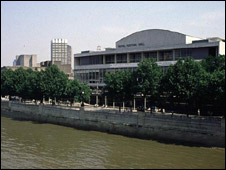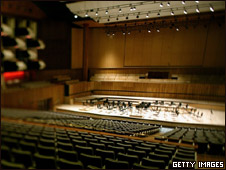The Royal Festival Hall 皇家节日音乐厅
The script of this programme 本节目台词
John: Hello, this is On the Town from BBC Learning English where we take you out on the streets of London to explore some of the big landmarks. With me is Oliver.
收听与下载
Oliver: Hi John, where are we going today?
John: Ok, we’re off to the Royal Festival Hall.
Oliver: Right, so what’s that? 皇家节日音乐厅在哪里,有什么用途呢? The Royal Festival Hall.
John: Well, this is arguably London’s premier music venue for all kinds of music, classical.

The Royal Festival Hall is on the South Bank of the River Thames
Oliver: 古典音乐。
John: Contemporary.
Oliver: 现代音乐。
John: Popular, or pop.
Oliver: 流行音乐。
John: And alternative music.
Oliver: 非主流音乐。
John: Also some jazz. It’s also a venue for everyone, and when it first opened it was known as the People’s Palace.
Oliver: 没错儿,这也是当初建造这个音乐厅的一个目的之一。就是将这里变成一个面对所有人的活动场所,不管贫穷的还是富有的,任何阶层的人都可以来这里一起欣赏各种不同类型的音乐。正是因为这个原因,让这个地方很快有了一个昵称,人民的宫殿 the People’s Palace.
John: We’re going to take you back to 1951 now when the Festival Hall first opened. Here’s the BBC’s Winford Vaughan Thomas, who was one of the first journalists to enter the building. Have a listen to his description of it.
For the first time we are seeing the Hall as it was designed to be. Full of light, crowds and fine dresses, music. It’s come splendidly to life and all around me four great stairways lead up to the promenades that surround the auditorium and I’ve got straight away an impression of great space.
BBC journalist Winford Vaughan Thomas

The inside of the Royal Festival Hall was renovated recently
John: And that’s what the Royal Festival Hall looks like today. It has been returned to the way it looked like when Winford Vaughan Thomas described it first in 1951.
Oliver: 在我们刚刚听到的这段历史录音里,记者 Winford 介绍说这是一个非常棒的地方。整个音乐厅都被游廊围绕着,游廊包围着演出大厅 the auditorium.
John: Now the Hall was built as part of the 1951 Festival of Britain, a big celebration held that year to try and boost the morale of the country following the Second World War.
Oliver: 在二战后,一个为鼓舞英国人民心而举办的艺术节, it boosted people’s morale.
John: We spoke to Jude Kelly, who is the Artistic Director of the cultural area of London known as the South Bank. It’s here that the Royal Festival Hall is located, on the South Bank of the River Thames.
Oliver: Jude Kelly 为我们介绍了在1951年举办英国艺术节时的情景。她是伦敦南岸中心的艺术总监, the Artistic Director, 南岸中心是英国伦敦著名的文化艺术中心, 也是皇家节日音乐厅所在地。
Well, the more I understand about the Festival of Britain, the more I think what an amazing achievement. You know they did it all in eighteen months, and they really were trying to re-emerge from the war, and it wasn’t just actually about let’s have a party and let’s have some fun, it was really a great commitment along with health, welfare and education to the idea of the arts and culture and creativity which we now all take for granted, but it was such a massive statement then.
Jude Kelly, Artistic Director of the South Bank
John: Well, let’s explain some of that because I think it’s important to look at the historical context in which the Festival was built.
Oliver: 没错,我们会回顾一下在音乐厅建造的时候的历史背景, the historical context.
John: Jude Kelly said she thought the Festival of Britain was an amazing achievement. There was a real commitment to celebrating a new way of life that was about to happen in Britain.
Oliver: 就是说艺术节是一个英国展示战后新生事物的地方,a showcase. Jude Kelly 说艺术节非常成功,取得了令人惊异的成就,an amazing achievement. 艺术节希望向人们展示健康 health, 安宁 welfare, 和教育 education, 将会成为未来英国人生活的中心和重点。
John: So we could say that the Royal Festival Hall symbolises a time of optimism in Britain.
Oliver: Optimism 乐观主义。
John: And that’s why so many people like the Hall today and wanted it restored. Well, that’s it for this edition of On the Town, join us again soon for more. Bye!
Oliver: 再见!